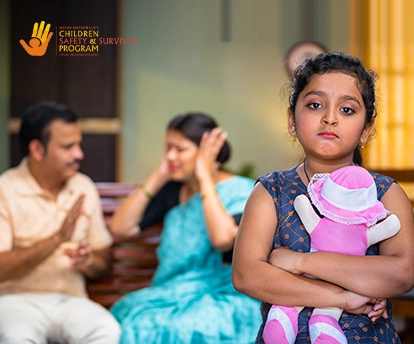
Within the walls of a home, where laughter and warmth should flourish, the spectre of constant parental fighting can cast a long and dark shadow, particularly when witnessed by innocent eyes. The psychological aftermath of such domestic discord on impressionable young minds is a topic of great significance, carrying repercussions that extend well into adulthood. Let us explore the intricate landscape of how children are psychologically affected by their parents’ perpetual battles, and attempt to offer actionable insights for parents and educators to navigate these stormy waters.
Anxiety and Fear: The continuous barrage of parental conflict breeds a sense of anxiety and fear within children. The very stability they seek at home crumbles, replaced by an unsettling anticipation of when the next argument might erupt.
Self-Blame and Guilt: Children, perceptive yet vulnerable, often internalize their parents’ disputes. They might believe that their actions are the cause of such strife, leading to self-blame and an erosion of self-worth.
Emotional Turmoil: Navigating constant conflict can disrupt the development of emotional regulation. Children may struggle to manage their feelings, leading to emotional outbursts or suppression.
Distorted Relationship Views: Growing up amid unending discord can distort a child’s understanding of healthy relationships. The models they observe at home become templates for their own interactions, perpetuating a cycle of conflict.
Constructive Communication: Parents must master the art of effective communication, showcasing that disagreements can be resolved through respectful dialogue. This models healthy conflict resolution and assures children that differences are manageable.
Private Conflict ResolutionResolution: Shielding children from heated disagreements is crucial. Consider options like private discussions to prevent exposing them to toxic exchanges that might harm their emotional well-being.
Emotional Intelligence: Instil emotional literacy in children. Teach them to identify and express their emotions in healthy ways, equipping them with essential skills to tackle conflicts in their own lives.
Professional Assistance: If conflicts persist, seeking guidance from a family therapist can provide a safe space to address underlying issues. This not only aids parents in rebuilding their relationship but also offers a stable haven for their children.
Educators stand as vital pillars of support in countering the impact of parental discord:
Open Dialogues: Teachers can foster an environment where children feel at ease discussing their emotions. This can aid in identifying those struggling due to parental conflicts.
Counselling Services: Schools should offer access to counsellor’s who can extend guidance and solace to children grappling with emotional challenges stemming from tumultuous home environments.
Holistic Programs: Incorporate educational programs cantered on conflict resolution, emotional management, and communication skills. These tools empower children to effectively cope with their emotions and challenges.

True Educator’s foster an environment where the child feels more secure and safe
WAYNE MACDONALD’S CHILDREN SAFETY & SURVIVAL PROGRAM (The CSS PROGRAM) in schools, seamlessly integrates practical lesson plans for students and interactive workshop sessions for parents.
Through practical self-awareness techniques, students are guided to reflect on their mental and physical vulnerabilities arising due to domestic discord and their subsequent decision-making process. This self-realization and the self-correction journey enhances and implements their mental & physical health.
Through interactive workshops by industry professionals, parents are encouraged to evaluate and self-reflect the impact of their domestic discord on themselves and their children as well as discuss strategies for fostering positive awareness and effective solutions to address this issue.
The collected feedback data from both students’ lesson plans and parent workshops is carefully analysed by the CSS PROGRAM trainers and transferred to school counsellors who then approach the data through meta-analysis in order to identify patterns and proactively take corrective action for optimal effectiveness.
The profound psychological toll of relentless parental conflict on children necessitates our unwavering attention and action. As guardians, parents, and educators, it is our duty to recognize the potential harm and proactively ensure that our homes remain sanctuaries for children’s emotional growth. By fostering transparent communication, nurturing emotional intelligence, and providing unyielding support, we can rewrite the narrative for the next generation, offering them a childhood free from the stormy aftermath of constant discord.
Ranjit Kumar is the COO of WAYNE MACDONALD’S CHILDREN SAFETY & SURVIVAL PROGRAM. With international entrepreneurial experience of over 25 years in education, communications, healthcare, and retail, he is a multiple industry award winner and is an honoured member of The International Who’s Who of Professionals, USA. His views have been sought & solicited in leading international publications. He can be contacted at: ranjit.kumar@pgi-corp.com or on linkedin : www.linkedin.com/in/ranjit-kumar-5b075b13